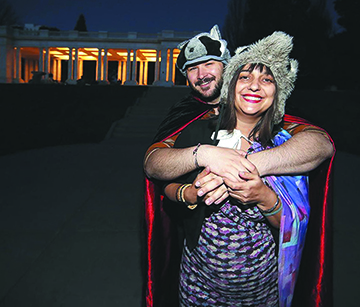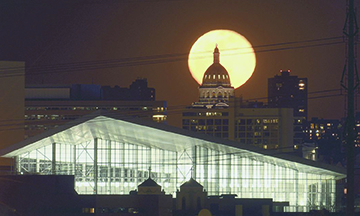by Robert Davis
Go outside at 8 p.m. anywhere in Colorado and you’re guaranteed to hear hundreds, if not thousands, of members from a Colorado-based Facebook group howling to support anyone and everything during the COVID-19 pandemic.

Founded by partners Shelsea Ochoa and Brice Maiurro in late March, the group has become a way for people to connect during a time when quarantines and shelter-in-place orders have greatly disrupted our way of life.
“It really shows that we can still interact within our communities and have fun while obeying the shelter at home orders, and also release some pent up feelings in a healthy and cathartic way,” Anna Beazer, one of the group’s organizers, told Glendale Cherry Creek Chronicle in an email statement.
Ochoa, a performer at Denver’s Museum of Nature and Science, and Maiurro, a poet and activist, got the inspiration to howl from a friend of theirs in Topanga, California, who told the duo that they howl at the sunset together. So, Ochoa and Maiurro decided to give it a try, too. They had no idea that what they considered a “fun social distancing activity” would resonate with people around the country — and the world.
The duo initially intended the group to include about a hundred of the couple’s friends and family. However, once word got out about the group, its membership swelled to over 8,000 members in the first day.
Now, members live in all 50 U.S. states and 46 countries around the world, including Tuvalu, Columbia, and Togo.
“There’s no wrong way to do it,” Ochoa told the Chronicle. “People can subscribe any kind of meaning they want to it.”
Many howl to support the medical professionals working late into the night. Others do it to support the homeless, or in remembrance of a lost loved one. No matter the reason, the group embraces any reason for howling as long as it’s healthy and positive, according to Beazer.

“The group purposefully is open to interpretations and reasons for howling,” she said. “We didn’t expect the amount of posts and comments dedicating their howling to lost loved ones but we embrace members sharing their stories about them.”
And there is no shortage of stories shared about grief and joy in the group’s discussion. Others purposefully ask seemingly innocuous questions like “What is your favorite quarantine snack?” but receive a wealth of positivity from members in return and connect with others who want to share their similarities.
“I had an accident last year and eventually chose to amputate my leg after several failed surgeries and being basically bedridden for the past year,” Cori Kolhagen, a Colorado resident, posted in one of the discussions.
“I finally accepted my ankle was never going to get better and that this would be the best option for me to return to my active lifestyle. My surgery was on March 3 and I have started to learn how to walk again using a prosthetic. I howl because we can get through this together, as a family.”
Every night, rain or shine, howlers from California to North Carolina, and up to Maine participate. Some howls have been capped off by fireworks or singing similar to the songs Spaniards and Italians sang from their balconies in a show of appreciation for their country’s healthcare workers.
Governor Polis has encouraged Coloradans to participate, calling it a necessary way for people to socialize and connect during this time of isolation.
For Beazer, the group’s message is more primal. It’s about letting go of all the anxieties people have been holding onto since the quarantines began. .
“We get lots of comments from first-time howlers that tell us they didn’t know that simply howling would help them release some emotions from being quarantined and help them feel connected to others when they hear howls back,” she said.
